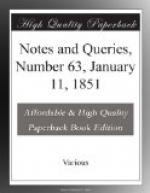And in the 14th of the canons of AElfric (pp. 348-9. of the same volume):—
“Acoluthus he is called, who bears the candle or taper in God’s ministries when the Gospel is read, or when the housel is hallowed at the altar: not to dispel, as it were, the dim darkness, but, with that light, to announce bliss, in honour of Christ who is our light.”
C.W.G.
Time when Herodotus wrote (Vol. ii., p. 405.).—The passage quoted by your correspondent A.W.H. affords, I think, a reasonable argument to prove that Herodotus did not commence his work until an advanced age; most probably between the ages of seventy and seventy-seven years. Moreover, there are various other reasons to justify the same conclusion; all which A.W.H. will find stated in Dr. Smith’s Dictionary of Greek and Roman Biography and Mythology, vol. ii. I believe A.W.H. is correct in his supposition that the passage has not been noticed before.
T.H. KERSLEY, A.B.
King William’s College.
Adur (Vol. ii., p. 108.).—The connexion of the Welsh ydwr with the Greek [Greek: hydor] is remarkable. Can any of your readers tell me whether there be not an older Welsh word for water? There are, I know, two sets of Welsh numerals, of which the later contains many Greek words, but the older are entirely different. Is not cader akin to [Greek: kathedra], and glas to [Greek: glaukos]?
J.W.H.
The Word “Alarm" (Vol. ii., pp. 151. 183.).—I send you an instance of the accurate use of the word “alarm” which may be interesting. In an account of the attempt made on the 29th of Oct. 1795, to assassinate Geo. III., the Earl of Onslow (as cited in Maunder’s Universal Biog. p. 321.) uses the following expression:—
“His Majesty showed,
and, I am persuaded, felt, no alarm; much less did
he fear.”
Is not this a good instance of the true difference of meaning in these two words, which are now loosely used as if strictly synonymous?
H.G.T.
The Conquest (Vol. ii., p 440).—W.L. is informed that I have before me several old parchment documents or title-deeds, in which the words “post conquestum” are used merely to express (as part of their dates) the year after the accession of those kings respectively in whose reigns those documents were made.
P.H.F.
Land Holland (Vol. ii., p. 267. 345.).—J.B.C. does not say in what part of England he finds this term used. Holland, in Lincolnshire, is by Ingulph called Hoiland, a name which has been thought to mean hedgeland, in allusion to the sea-walls or hedges by which it was preserved from inundation. Other etymologies have also been proposed. (See Gough’s Camden, “Lincolnshire.”) In Norfolk, however, the term olland is used, Forby tells us, for “arable land which has been laid down in grass more than two years, q.d. old-land.” In a Norfolk paper of few months since, in an advertisement of a ploughing match, I observe a prize is offered “To the ploughman, with good character, who shall plough a certain quantity of olland within the least time, in the best manner.”




